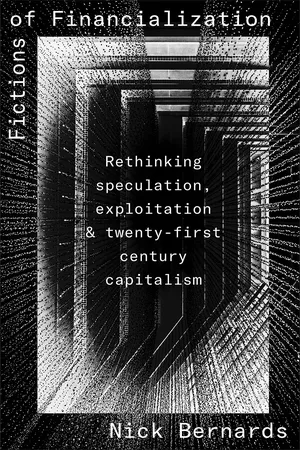
Fictions of Financialization
Rethinking Speculation, Exploitation and Twenty-First-Century Capitalism
- English
- ePUB (mobile friendly)
- Available on iOS & Android
Fictions of Financialization
Rethinking Speculation, Exploitation and Twenty-First-Century Capitalism
About this book
'Incisive, politically engaged, and theoretically sophisticated … A must-read for anyone concerned with the prospects of a liveable and sustainable future for all on this planet' Ilias Alami, author of Money Power and Financial Capital in Emerging Markets
'A comprehensive critique of the financialization discourse, offering vital insights' Jack Copley, author of Governing Financialization
For decades, many people on the left have decried the finance sector as the main culprit for the toxic effects of capitalism. Only by confronting finance, so the story goes, can there be any hope for a more sustainable economy.
Nick Bernards makes the case against the dominance of this story. Arguing that the concept of financialization is ill-understood, Bernards shows how we risk glossing over the true nature of capitalism when focusing on the mythical powers of finance.
Rather than indulging in the harmful fantasy that confronting the financial elite will fix the economy, Bernards provides an alternative approach. Starting from the premise that risk and speculation are core to the operation of all capital and not just the hallmark of a perverted financial sector, this Marxist reading of the interconnection between capitalism's uneven exploitation of labour and nature and financial capital lays the groundwork for a much-needed view of the real powers of finance.
Nick Bernards is Associate Professor of Global Sustainable Development at the University of Warwick. He is the author of A Critical History of Poverty Finance and The Global Governance of Precarity.
Frequently asked questions
- Essential is ideal for learners and professionals who enjoy exploring a wide range of subjects. Access the Essential Library with 800,000+ trusted titles and best-sellers across business, personal growth, and the humanities. Includes unlimited reading time and Standard Read Aloud voice.
- Complete: Perfect for advanced learners and researchers needing full, unrestricted access. Unlock 1.4M+ books across hundreds of subjects, including academic and specialized titles. The Complete Plan also includes advanced features like Premium Read Aloud and Research Assistant.
Please note we cannot support devices running on iOS 13 and Android 7 or earlier. Learn more about using the app.
Information
Table of contents
- Cover
- Title
- Copyright
- Contents
- Acknowledgements
- Introduction
- 1. What is Financialization?
- 2. Finance as Process
- 3. Finance and Production
- 4. Finance and Nature
- 5. Finance and the State
- 6. Conclusion: Revolutionizing Finance
- Notes
- Index